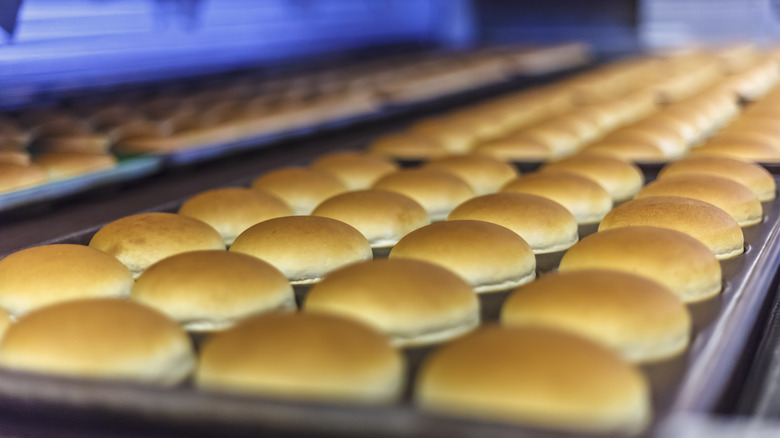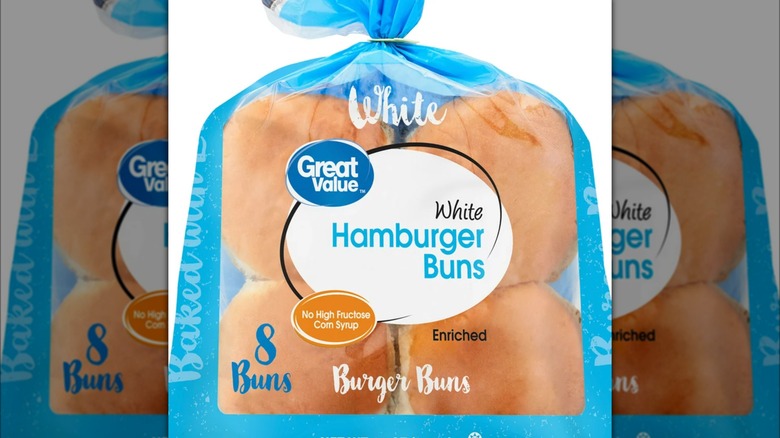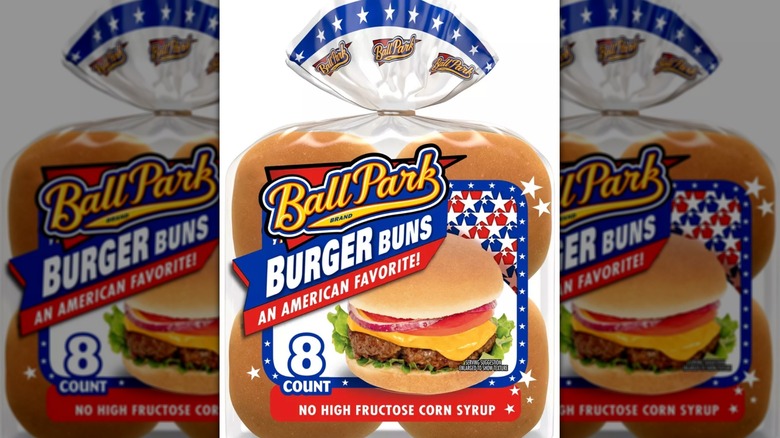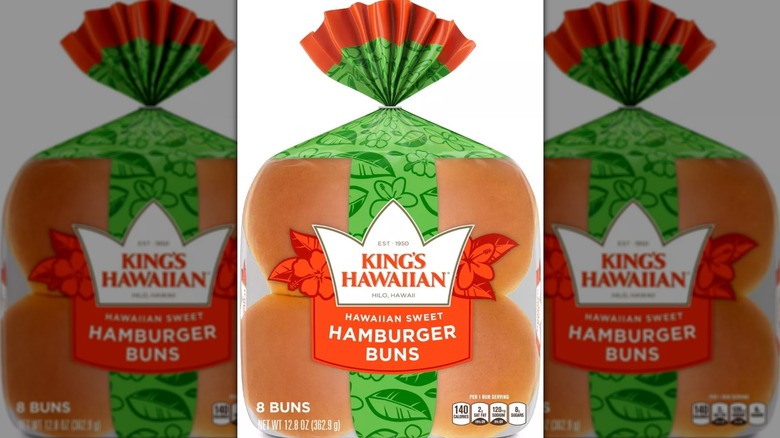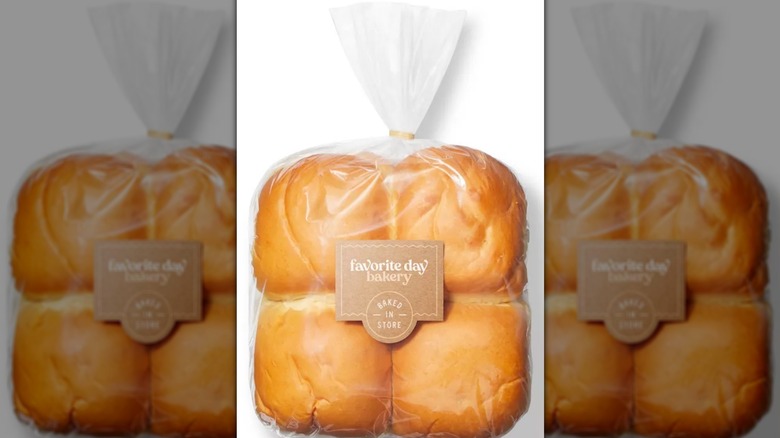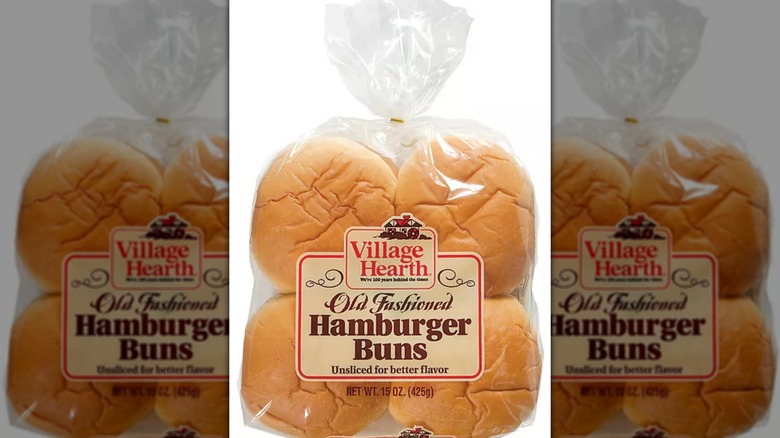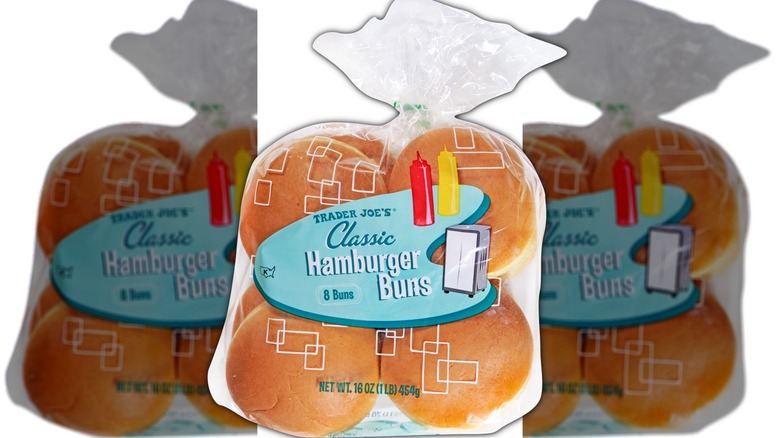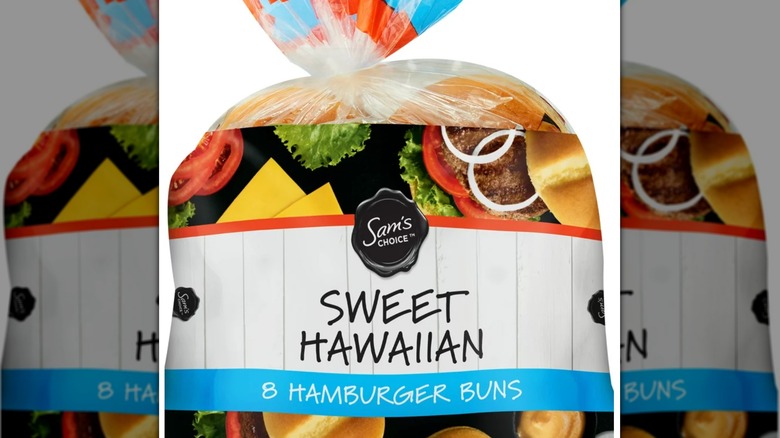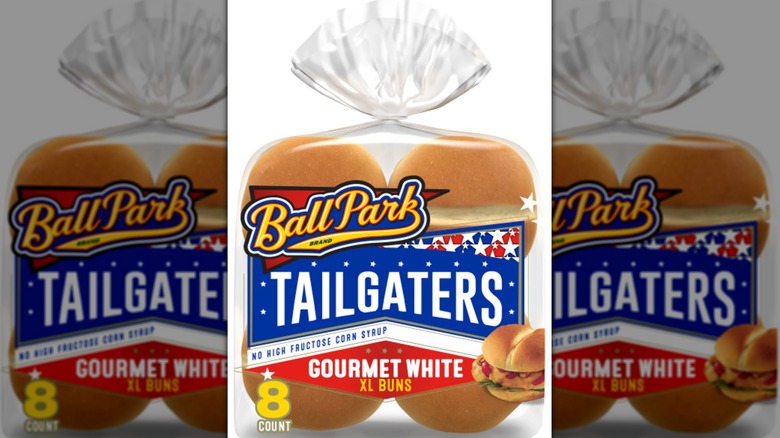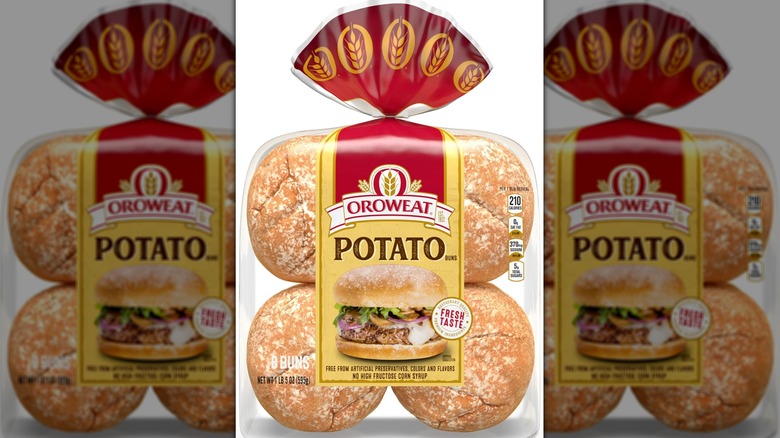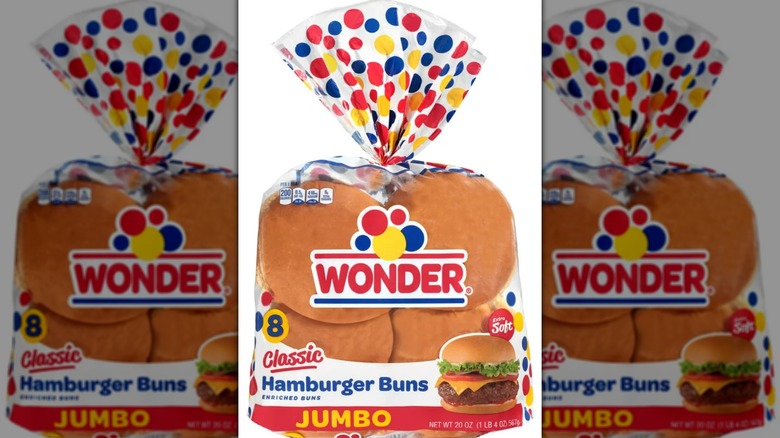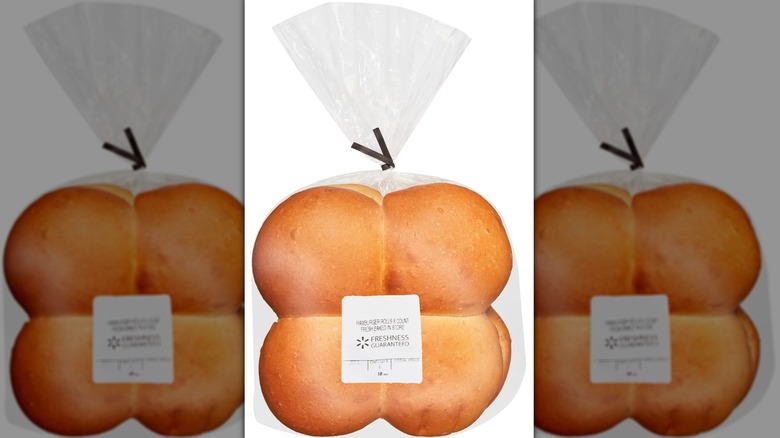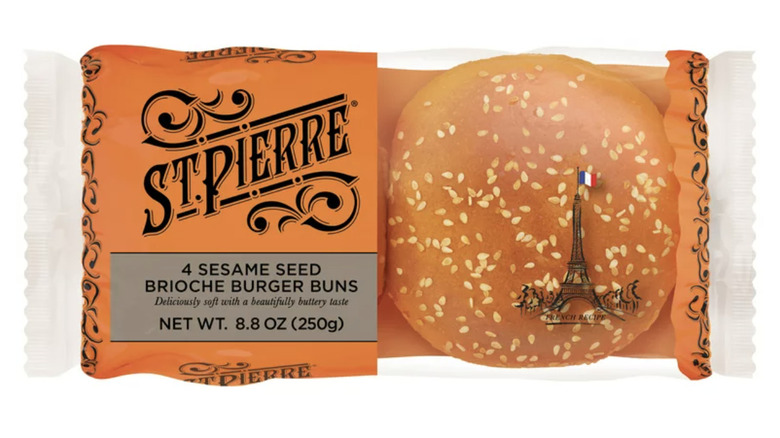The 13 Unhealthiest Store-Bought Burger Buns
We may receive a commission on purchases made from links.
Certain foods have an iconic reputation — one that's way bigger than their actual physical size. The burger bun is one of these. Hamburgers would be nothing without the pillowy rolls that they sit in, with their round shape providing the perfect handheld vessel for the meat, cheese, and toppings tucked within it.
While rolls and buns have been around forever. The first specific burger bun was first created in 1916 by a fry cook named Walter Anderson, who would later go on to co-found the slider chain, White Castle. Prior to this invention, burger patties were traditionally served between slices of bread or toast.
Once the burger bun was invented, there was no going back. Sometime around the middle of the 20th century, the sesame-seed bun appeared. By the time McDonald's came along with its Big Mac – served on a sesame-seed bun — the burger bun was cemented in history. Nowadays, thanks to the endless popularity of burgers, buns are available in pretty much every supermarket across the country. But their mass appeal has resulted in mass production, and this can lead to manufacturers cutting corners or adding ingredients to make their products taste better, or last longer. While few people are convinced that burger buns are a healthy food, a few of these products are especially unhealthy.
1. Great Value White Hamburger Buns
If you're rustling up some simple burgers on a weekday night and don't want to break the bank, Walmart's Great Value option seems like a winner. The supermarket's low-cost range has been around since 1993. It now has thousands of products intended to be used daily at a cheap price, but which still meet rigorous quality standards.
Unfortunately, the Great Value White Hamburger Buns don't quite cut the mustard nutritionally. This is mainly down to the fact that they're made with enriched wheat flour. Enriched wheat flour is a highly processed product that's commonly used in commercial baking. At first glance, it might seem like a good option, thanks to the vitamins and minerals added to it. These vitamins and minerals, however, are simply used to replace the ones lost during the process of making the flour, during which parts of the wheat are stripped away – so it's not actually better for you.
This processing also makes it very easy for your digestive system to absorb the flour quickly. When the wheat is stripped, the fiber in it is taken with it. This isn't necessarily a good thing. This can result in your blood sugar shooting up, and then dropping rapidly, making you hungry again pretty rapidly. Ideally, you should look for bread products that are made with whole wheat flour, or those which have a high fiber content.
2. Ball Park Hamburger Buns
As a brand, Ball Park is nothing if not confident. The company proudly proclaims that its products are "America's Favorite Buns" on its website. Its burger and hot dog buns seek to accompany its famous patties and franks. But while you might be comforted by the familiar nature of Ball Park's buns, you'll be less comforted by their sodium content. Ball Park Hamburger Buns have a surprisingly high level of sodium per serving, with 280 milligrams in each bun.
This is approximately 12% of your daily value, and it's being spent on a food item that's pretty neutral-tasting and is bound to be accompanied by salty meat, cheese, and sauces. Unfortunately, this is part of a larger issue of sodium sneaking its way into our bread products across the board. "Bread is an essential staple food in many countries but is still a key source of salt in our diets due to the frequency with which we eat bread," nutritionist Mhairi Brown told the World Action on Salt & Health. "Globally we must do more to reduce salt intake, and a simple way to do this is to lower salt in our staple foods."
Excessive sodium in the diet is linked to various chronic diseases, including cardiovascular disease and osteoporosis, per the Harvard T. H. Chan School of Public Health. Skip this brand, and seek out low-sodium buns.
3. Wonder Classic Hamburger Buns
Wonder Bread will conjure fond memories of growing up for some people, with the brand supplying loaves to make lunchbox sandwiches for over 100 years. As well as classic white, whole wheat, and Italian loaves, the company also makes a host of buns and rolls. But it's the standard burger bun you should watch out for. The Wonder Bread Classic Hamburger Buns contain both monoglycerides and diglycerides, both of which give a clue as to how processed they are.
Both of these ingredients are emulsifiers, which bring all of the components in bread together to create a uniform, predictable product. The issue with monoglycerides and diglycerides is not so much with the ingredients themselves, which are perfectly safe. It's that when they're present in bread, it's an indicator that they're working to pull together a wide variety of things, and are often included at the expense of standard, more nutritious ingredients like eggs and milk, neither of which are anywhere to be found in these buns.
A further ingredient, calcium peroxide, gives another indication of the quality of this bread. Calcium peroxide helps to condition dough and build gluten and is usually added when the base flour is of low quality.
4. King's Hawaiian Sweet Hamburger Buns
While plenty of people still love a classic burger bun, others love using a Hawaiian roll for their patties. Hawaiian rolls began to gain mainstream popularity in the 1960s, when baker Robert Taira took his recipe for sweet and fluffy rolls from his bakery in Hilo, Hawaii to a larger factory in Honolulu. People quickly found that these buns were versatile to eat alongside both savory and sweet foods, and the Taira family founded King's Hawaiian, churning out loaves and burger buns for the masses.
King's Hawaiian Sweet Hamburger Buns are definitely true to their name; these things are sweet, and they have the added sugar to prove it. Each burger bun contains 7 grams of added sugar, which is 14% of your daily value. While this may make the bread sweeter, it will also add calories to your diet without any additional nutrients to go with them.
As having too many added sugars in our diet is common for many people, it's always worth considering how you can cut down on them — such as by choosing a different burger bun. King's Hawaiian Sweet Hamburger Buns also have 2 grams of saturated fat per serving, which is a tenth of your daily value, a fairly high amount for a bread product.
5. Target Favorite Day White Hamburger Buns
Burger buns that are baked fresh in-store are a preferable choice for many people. They bring with them the promise of bread that's not been sitting in a plastic wrapping for days on end, being thrown from production lines to trucks, staying fresh through the addition of copious additives. However, if you're buying Target's freshly-baked option — its Favorite Day White Hamburger Buns – you might be surprised at the number of ingredients that go into this simple staple. These buns have dozens of items in their recipe, and multiple different sugars, including maltodextrin and dextrose.
Both of these are processed carbohydrates and are used as artificial sweeteners. Dextrose, in particular, works like regular glucose and can have the same rapid impact on blood sugar. It can also bring similar risks when eaten in high quantities, potentially impacting your potential for liver and kidney disease, type 2 diabetes, and weight gain, per WebMD. Admittedly, the quantity of dextrose in these burger buns is likely low, so it may not have a huge impact. But if you're getting dextrose or maltodextrin from other sources in your diet, you may find things start to add up.
6. Village Hearth Hamburger Buns
Village Hearth prides itself on its traditional nature. The company's slogan, "100 Years Behind The Times," seems to indicate that it's invested in doing things the old-fashioned way. This is likely part of what's made the brand a hit.
But anyone who looks at the ingredients list of its hamburger buns will see that Village Hearth is actually pretty good at using ultra-modern, ultra-processed items in its food, like high fructose corn syrup. This sweetener is derived from corn, and it can affect your blood sugar significantly, causing it to spike and then drop — potentially made even more drastic by the relatively low levels of fiber in these burger buns.
It's worth remembering that while food manufacturers have improved in their use of this contentious ingredient over time, high fructose corn syrup consumption is still high. In 2018, Americans ate an average of 37 pounds of it each year, according to Statista. There are multiple burger bun options on the market that avoid using high fructose corn syrup entirely, which makes it somewhat disappointing that Village Hearth, with its emphasis on doing things the old-school way, puts it in its buns.
7. Trader Joe's Classic Hamburger Buns
There's something about Trader Joe's that makes its products feel fresher and healthier than the stuff you get at other supermarkets. But that's not necessarily true with every item. One product that doesn't get the nutritional seal of approval is its Classic Hamburger Buns. Trader Joe's may say that it makes its buns with wheat flour, but this is still the unbleached enriched kind, which is highly processed and doesn't contain any of the natural advantages of whole-wheat flour.
Additionally, this processing strips the flour of fiber, leaving these buns with less than a gram of it per serving. According to MayoClinic, it's recommended that men should aim for 30 to 38 grams of fiber daily, and women get 21 to 25 grams each day. But, according to a study, only one in 20 Americans actually do so. Fiber is essential to keep our blood sugar in check and avoid spikes, to look after our digestive system, and to lower the risk of various chronic diseases, per the Harvard T. H. Chan School of Public Health. As fiber frequently comes from our carbohydrate food sources, it's a shame to see that these buns contain barely any.
Somewhat surprisingly, too, while Trader Joe's Classic Hamburger Buns use enriched flour, there doesn't seem to be much enrichment going on. There are barely any vitamins or minerals in the buns, and comparable products which are cheaper have higher nutrient levels.
8. Sam's Choice Sweet Hawaiian Hamburger Buns
When a product says how sweet it is in its name, you can expect it to be that way. This is what makes Sam's Choice Sweet Hawaiian Hamburger Buns so surprising. This product has a curiously low amount of added sugar for a sweet roll, with only 2 grams in each bun. Its sodium content, however, is another story.
In each bun, there are 250 milligrams of sodium, over 10% of the average adult's daily value. Sodium has an important function in sweet foods, and while you might expect it to make things taste saltier, in low concentrations it can actually make items taste sweeter and tastier, as well as less bitter. The problem, though, is that people can happily munch on foods like Sam's Choice Sweet Hawaiian Hamburger Buns without considering that they might have a high sodium content, and then raise their sodium intake above the recommended amount.
It's also useful to consider that this product's nutritional information doesn't look great elsewhere, either. There's virtually no fiber in these hamburger buns, not a huge amount of vitamins or minerals despite using enriched flour, and a small amount of saturated fat.
9. Ball Park Tailgaters Gourmet White XL Buns
For those supersized burgers, Ball Park has made efforts to keep you covered. Its Ball Park Tailgaters Gourmet White XL Sandwich Buns are significantly larger than its alternative products. But unfortunately, its nutritional information reflects this, making it a particularly unhealthy bun.
The first issue lies with its carbohydrate content, with 38 grams per piece of bread. For a regular diet, which should contain between 225 to 325 grams of carbs — according to Medical News Today – this is an option that on paper could fit in nicely. But these carbs come from enriched wheat flour, with only 1 gram of fiber in each portion, making them less nutritious than those which come from whole-wheat or whole-grain sources.
There are also sodium levels to consider. As jumbo buns, Ball Park Tailgaters Gourmet White XL Sandwich Buns have around 400 milligrams of sodium each. That's over a fifth of your recommended daily value for every piece of bread. It also means more space for toppings, which could spike your sodium intake even more. A single slice of American cheese, for example, can contain 290 milligrams of sodium, and a tablespoon of Heinz ketchup has 180 milligrams. Add it all together, including the beef itself and any seasonings, and you'll have a salty sandwich in your hands.
10. Oroweat Potato Sandwich Buns
Potato buns have several advantages over regular buns, which make them perfect for burgers. They're able to avoid the slightly cloying, doughy texture that wheat buns sometimes take on thanks to the potato flour used to make things super-fluffy, and they have a neutral taste that allows the meat and toppings to shine. But if you're looking for potato rolls, you'd be wise to avoid Oroweat Potato Sandwich Buns.
While they might look rustic, these buns are full of additives, including high levels of sodium and significant added sugars. While Oroweat proclaims that this sodium comes from sea salt, you shouldn't assume that this makes its buns any healthier. Sea salt may be less processed than table salt and other types of salt, but fundamentally they have similar amounts of sodium – and at the end of the day, sodium is sodium, and will impact your body in the same way no matter where it comes from. Given that Oroweat Potato Sandwich Buns have 14% of your daily value for sodium, that's a fair whack in one go, so it's useful to be on your guard. Don't forget about those 5 grams of added sugar, either.
11. Wonder Jumbo Classic Hamburger Buns
Wonder Bread has a burger bun for every patty size, and for the biggest pieces of meat out there, the Wonder Jumbo Classic Hamburger Buns are a perfectly-shaped vehicle. But you might find that they're a little sweet for your taste, thanks to the inclusion of high fructose corn syrup, which contributes to the 6 grams of added sugar in these buns.
High fructose corn syrup is a common ingredient in processed foods and has long been the enemy of nutritionists and doctors alike, because of its worrisome impact on health. "Chronic overconsumption of high fructose corn syrup causes an increase in fat production and worsens insulin sensitivity," states the Hospital of Central Connecticut's clinical nutrition manager Jennifer Feda to Hartford HealthCare. High fructose corn syrup is especially impactful because the fructose in it has to be processed by the liver before it's able to be used as an energy source, adding a further layer of activity that increases the strain on our bodies. This fat production can cause weight gain, and lead to multiple chronic diseases associated with it, like fatty liver disease, heart disease, and high cholesterol. If that wasn't bad enough, it can also disrupt bacteria levels in the gut, making you gassier.
12. Walmart Freshness Guaranteed Hamburger Rolls
Your local Walmart may seem to have every prepackaged product in the world under its roof, but it has some fresh ones too. Many stores have in-house bakeries, which make a variety of bread and sweet treats daily, including its Freshness Guaranteed Hamburger Rolls. But you shouldn't expect these buns to be more nutritious than other options. In fact, Walmart's Freshness Guaranteed Hamburger Rolls are seriously lacking in any vitamins and minerals, with a small amount of vitamin C and iron in each bun, and not much of anything else.
This is pretty surprising given that these buns are made with enriched flour. While the ingredients list does indicate that there are certain B vitamins in these rolls, like riboflavin and folic acid, it's unclear exactly how much is in each bite. There's also a fairly hefty amount of sodium in each bun, with 11% of your daily value coming from 250 milligrams of sodium per serving.
13. St. Pierre Sesame Seed Brioche Burger Buns
Brioche burger buns have been all the rage for a while now and for good reason. The light, sweet flavor of brioche dough pairs excellently with the savory smack of meat and cheese. Plus, the crumb has a sturdiness to it that allows the buns to retain their shape, even when laden with food. It's little surprise that brioche buns have made their way from burger restaurants to supermarket shelves, and St. Pierre Brioche Sesame Seeded Burger Buns are a popular choice. They may not be the healthiest, though, due to the saturated fats, sodium, and added sugars in the dough.
Each bun contains a gram of saturated fat supplied by the butter in the recipe. While this may not seem a lot, it's still 5% of your daily value. When you then take into account the burger patty, which has roughly 8.5 grams of saturated fat on average, and any cheese or bacon you're adding, these amounts start to add up.
There are also 290 milligrams of sodium and six grams of added sugar in each bun. All of this wouldn't seem so bad if these St. Pierre buns had some positive nutritional aspects. But unfortunately, there appear to be minimal amounts of vitamins and minerals in the flour, too, with a mere 4% of your iron daily value, and 2% of your recommended potassium intake.
